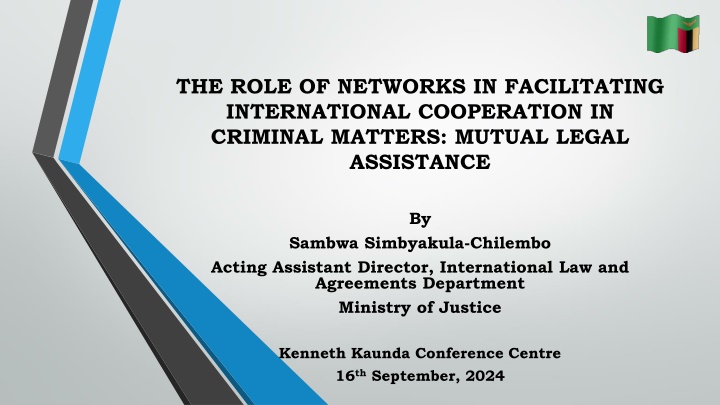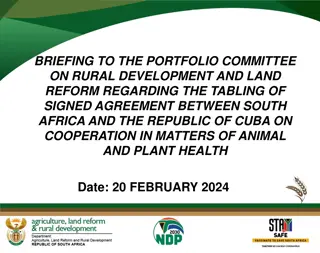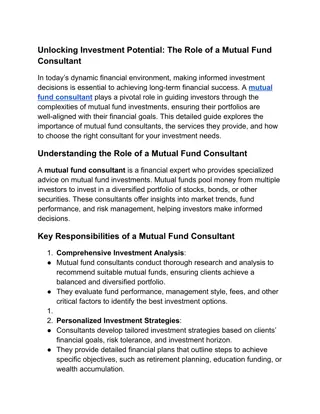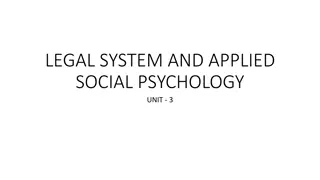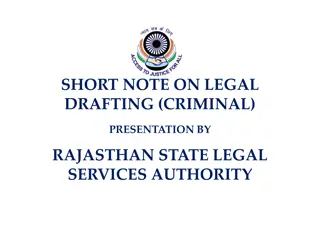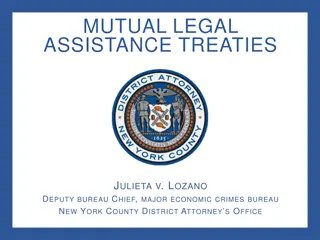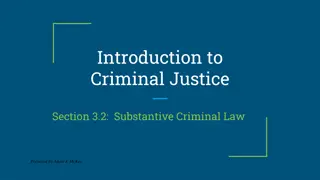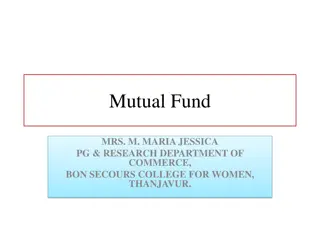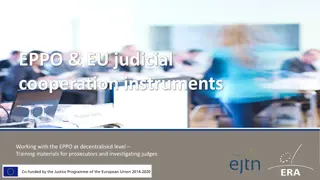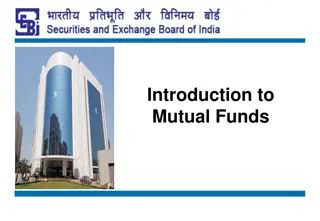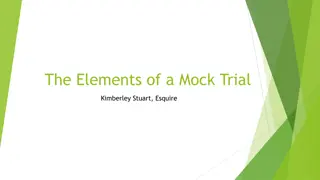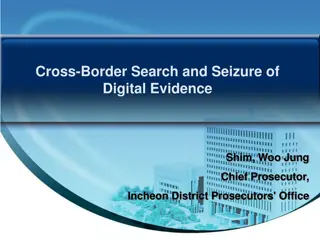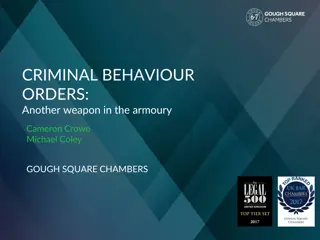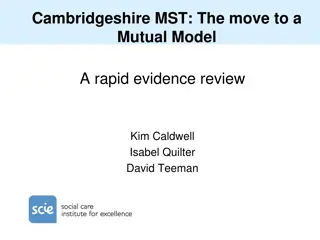Facilitating International Cooperation in Criminal Matters: Mutual Legal Assistance
Understanding the role of networks in promoting international cooperation through mutual legal assistance in criminal matters. Explore the national legal framework in Zambia and the basis for regional or international cooperation. Learn about key laws facilitating collaboration and extradition processes.
Uploaded on Mar 12, 2025 | 1 Views
Download Presentation

Please find below an Image/Link to download the presentation.
The content on the website is provided AS IS for your information and personal use only. It may not be sold, licensed, or shared on other websites without obtaining consent from the author.If you encounter any issues during the download, it is possible that the publisher has removed the file from their server.
You are allowed to download the files provided on this website for personal or commercial use, subject to the condition that they are used lawfully. All files are the property of their respective owners.
The content on the website is provided AS IS for your information and personal use only. It may not be sold, licensed, or shared on other websites without obtaining consent from the author.
E N D
Presentation Transcript
THE ROLE OF NETWORKS IN FACILITATING INTERNATIONAL COOPERATION IN CRIMINAL MATTERS: MUTUAL LEGAL ASSISTANCE By Sambwa Simbyakula-Chilembo Acting Assistant Director, International Law and Agreements Department Ministry of Justice Kenneth Kaunda Conference Centre 16thSeptember, 2024
Introduction: Mutual Legal Assistance in Criminal Matters Mutual legal assistance is any assistance given by the Requested State in respect of investigations, prosecutions or proceedings in the Requesting State in a criminal matter, irrespective of whether the assistance is sought or is to be provided by a court or some other competent authority. The principle of mutual legal assistance in criminal matters, also referred to as judicial assistance and cooperation, centers around two obligations accepted by States: the obligation criminals themselves or to extradite concerned by the crime committed or to the State that has an interest in pursuing the accused. either to prosecute accused presumed the State the to
National legal framework relating to mutual legal assistance in Zambia The Mutual Legal Assistance in Criminal Matters Act Chapter 98 of the Laws of Zambia provides for the implementation of treaties for mutual legal assistance in criminal matters. Zambia has a dualist system and the status of international treaties in the national legislative framework is enforceable if they are ratified and domesticated so that they become part of the domestic or municipal law. Section 7 of the Act states that where there is no treaty between Zambia and another state, the Minister responsible for home affairs may, with the agreement of the Minister, enter into an administrative arrangement with that other state providing for legal investigation specified therein relating to an act that, if committed in Zambia, would be an indictable offence. that international treaties are only assistance with respect to an
National laws on the basis of which regional or international cooperation can be sought? Cooperation is on the basis of national laws. Zambia follows a dualist legal tradition. Most national laws are based on international treaties or conventions. The national laws on the basis of which cooperation can be sought in Zambia are: - 1. The Constitution of Zambia; 2. The Mutual Legal Assistance in Criminal Matters Act Chapter 98; 3. The Extradition Act Chapter 94;
National laws on the basis of which regional or international cooperation can be sought? Cont d 4. The Transfer of Convicted Persons No. 26 of 1998; 5. The Forfeiture of Proceeds of Crimes Act No. 19 of 2010; 6. The Anti-Human Trafficking Act No. 11 of 2008; 7. The Penal Code Act Chapter 87; and the 8. The Criminal Procedure Code Act Chapter 88.
Judicial cooperation requests with respect to Mutual Legal Assistance Which entity should submit the request? The Attorney-General. The Mutual Legal Assistance in Criminal designates the Attorney-General as the competent Authority or central authority. Section 9 of the MLA Act. Matters Act (MLA Act) Entities responsible are the Ministry of Home Affairs and Internal Security and the Ministry of Justice. Which entity should the requesting State address the request to? The Attorney-General. Section 10 of the MLA Act.
Procedures applicable to Mutual Legal Assistance in criminal matters requests The magistrate may issue a search warrant for the search and seizure of any item or property which is considered necessary to help with the investigation and prosecution of the case. The Criminal Procedure Code Act (CPC) shall apply, with the necessary modifications, in respect of a search or a seizure under the MLA Act, except where the CPC is inconsistent with the MLA Act.
Mutual Legal Assistance: Production of documents Once documents have been obtained, they are submitted to the Attorney-General for authentication before they are sent to the Requesting State for production in evidence. Where Zambia is requesting documents, only properly authenticated documents by the competent authority may be admitted in evidence.
Procedures Section 10(2) states that a request under subsection (1) shall be accompanied by- (a) the name of the authority concerned with the criminal matter to which the request relates; (b) a description of the nature of the criminal matter and a statement setting out a summary of the relevant facts and laws; (c) a description of the purpose of the request and the nature of the assistance being sought; (d) details of the procedure that the foreign state wishes to be followed by Zambia in giving effect to the request, including details of the manner and form in which any information, document or thing is to be supplied to the foreign state pursuant to the request;
Procedures Contd Failure to comply with this subsection shall not be a ground for refusing the request. Section 11(1) of the MLA Act makes provision for the circumstances under which a request for MLA may be refused. A request by a foreign state for assistance under this Act shall be refused if, in the opinion of the Attorney-General- (a) the request relates to the prosecution or punishment of a person for an offence that is, or is by reason of the circumstances in which it is alleged to have been committed or offence of a political character; was committed, an
Procedures Contd What happens once a request for MLA has been successfully received? 12. (1) Where the Attorney-General approves a request of a foreign state to enforce the payment of a fine imposed by a court of criminal jurisdiction of the foreign state, the High Court shall have jurisdiction to enforce the payment of the fine. (2) The fine shall be recoverable in civil proceedings instituted by the foreign state as if the fine had been imposed by the High Court. (3) No proceedings under subsection (2) shall be more than five years after the fine was imposed.
Procedures Contd 13. (1) The Criminal Procedure Code shall apply, with the necessary modifications, in respect of a search or a seizure under this Act, except where that Act is inconsistent with this Act. (2) Where the Attorney-General approves a request of a foreign state to have a search or a seizure carried out in Zambia regarding an offence with respect to which the foreign state has jurisdiction, the Attorney-General shall authorise a police officer in writing, to apply ex parte for a search warrant to a magistrate.
Challenges Most common (legal and practical) obstacles encountered by national authorities in facilitating MLA requests. supporting documents. Insufficient information due to failure to submit required domestic legislation and practice in executing requests. Differences in legal regimes, e.g between States in their turn around time. Bureaucracy in the processes which leads to a very long
Best Practice recommendations for facilitating international cooperation in mutual legal assistance in criminal matters Strenthening the effectiveness of central authorities central authorities should be staffed with practitioners who are legally trained, and who have developed institutional expertise an administrative arrangement would suffice. Enhancing the efectiveness of mutual legal assistance treaties and legislation States should develop broad mutual legal assistance laws and treaties in order to create such a legal basis. Ensuring awareness of national legal requirements and best practices for domestic and foreign officials involved in the mutual legal assistance process - know the procedures to follow to obtain that assistance in relation to an investigation or prosecution.
Best Practice recommendations for facilitating international cooperation in mutual legal assistance in criminal matters Cont d Expediting cooperation through the use of alternatives to formal mutual legal assistance requests information or intelligence to be sent through police to police, which is faster than the more formal route of mutual legal assistance. Maximising effectiveness through authorities in other States contact between members of the central authorities, prosecutors and investigators from the requesting and requested States is critically important at every stage in the mutual legal assistance process. direct personal contact with
Importance of networking in facilitating international cooperation in criminal matters 1. Networks play a crucial role in facilitating international cooperation in criminal matters, particularly in the context of mutual legal assistance. 2. The networks provide a platform for law enforcement agencies, judicial authorities, and other communicate and collaborate investigations and prosecutions. relevant on stakeholders to cross-border criminal
Importance of networking in facilitating international cooperation Cont d 3. One of the key functions of these networks is to streamline the process of requesting and providing between States which involves information, evidence, and other forms of support necessary for investigating and prosecuting transnational crimes. 4. Networks also help to ensure that requests for assistance are properly formatted and submitted to the appropriate authorities in a timely manner, thereby enhancing the efficiency and effectiveness of international cooperation in criminal matters. mutual legal the assistance exchange facilitating of
Importance of networking in facilitating international cooperation Cont d 5. Networks play a critical role in promoting capacity-building and knowledge sharing among States fostering greater understanding and cooperation between States. 6. Networks contribute to the development of a well coordinated and effective response to international criminal activities. 7. Networks serve as an essential international cooperation in criminal matters by facilitating communication, networks play transnational crime and upholding the rule of law on a global scale. mechanism for promoting a crucial role in combating
